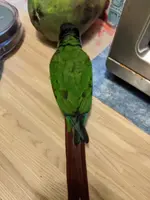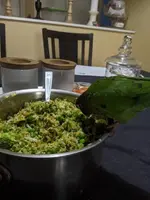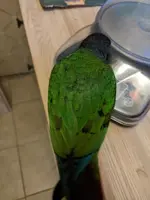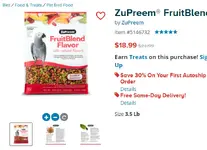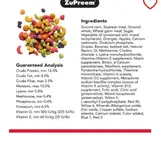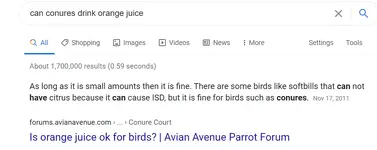CarrotSticks
New member
- Jan 8, 2021
- 2
- 0
- Parrots
- Green Cheek Conure - Emmy
I apologize in advance for the long forum-post.
Emmy, my green cheek conure has been with me for about 1.5 years now. A few months ago, I took her to the vet because I saw that her diet had to be changed from all seeds to pellets and fresh veggies and fruit since she had black tips on her feathers.
The vet ended up saying that because she was a tropical bird, she needed more fruit in her diet, such as pineapple, papaya, cantaloupe, etc. She told me that green cheeks do not really eat leafy greens and will usually just play with it instead. This is where I was conflicted because I had been researching, it seems that too much fruit in a bird's diet is terrible, and I believed that she needed more vegetables, and I’ve seen GCC’s eat vegetables. I don't know whether to listen to my vet and add mostly only "tropical" fruits in her diet or to try giving her vegetables instead. The vet also advised me to switch her to pellets.
Currently, as I know that too much fruit is bad for a bird due to too much sugar, I started making chop from the BirdTrick's Seasonal Feeding System, and I thought it would solve my problems (it didn’t). She just picks at it. I also gave her about a chunk of cantaloupe, pineapple, blueberries, or whatever I had once a day. She eats a little, but not too much. I’m afraid I’m starving her so I give her a little bit of seed everyday just in case. Additionally, I am trying to give my GCC pellets, which she eats occasionally if she's really hungry.
Honestly, the black tips seem to be getting worse, and what kills me more is that she is very hormonal right now. I'm not sure if the black feathers are caused by her diet, the amount of time she comes out everyday, too much light, lack of sunlight, or boredom and stress. I know that she would stop being hormonal if her diet was better, and I feel like I've run out of solutions. I’ve ordered more toys so that she is less bored, which I’m assuming because she screams so often. I’ve also tried taking her out for about 15-30 minutes every-other day in the sunlight, but I don’t think that’s helping. I thought that maybe too much light would cause her regurgitation, as she goes to bed around 8:30ish and wakes up at 7. She comes out about 2 ½ - 3 hours everyday because I am so extremely busy with school (maybe that’s it?) I don’t know anymore what’s causing it.
I thought maybe the vet's advice would help, but I assume when I took her to the vet she just examined my bird and didn't run any blood tests. I've seen many videos of GCCs who eat chop, veggies, pellets, and limited fruit and their feathers are beautiful and healthy! I don’t know who to listen to honestly anymore.
I'm so conflicted and frustrated, because nothing seems to be working, and as a result, my bird is continuing to be hormonal and very annoying when I take her out because all she does is regurgitate and look for dark places to hide. I am trying my best to get her to eat the chop that I freeze and give to her, but she only picks out what she likes, even if it's finely chopped. And when she comes out, I try to discourage her hormonal behavior, and try training sessions instead. She ignores me most of the time to search for dark places instead. Any advice on what I should do? How to get her to eat vegetables and pellets? Any opinions on what my vet said?
I’d really appreciate anyone’s opinion or advice, and I’m so frustrated because nothing is working, and I feel guiltier and guiltier when her feathers look worse and worse. I dislike spending time with her now because she is so hormonal. Help me please! I’ve left a picture of her feathers down below, sorry if it’s blurry and I left a picture of her chop that she barely eats.
Emmy, my green cheek conure has been with me for about 1.5 years now. A few months ago, I took her to the vet because I saw that her diet had to be changed from all seeds to pellets and fresh veggies and fruit since she had black tips on her feathers.
The vet ended up saying that because she was a tropical bird, she needed more fruit in her diet, such as pineapple, papaya, cantaloupe, etc. She told me that green cheeks do not really eat leafy greens and will usually just play with it instead. This is where I was conflicted because I had been researching, it seems that too much fruit in a bird's diet is terrible, and I believed that she needed more vegetables, and I’ve seen GCC’s eat vegetables. I don't know whether to listen to my vet and add mostly only "tropical" fruits in her diet or to try giving her vegetables instead. The vet also advised me to switch her to pellets.
Currently, as I know that too much fruit is bad for a bird due to too much sugar, I started making chop from the BirdTrick's Seasonal Feeding System, and I thought it would solve my problems (it didn’t). She just picks at it. I also gave her about a chunk of cantaloupe, pineapple, blueberries, or whatever I had once a day. She eats a little, but not too much. I’m afraid I’m starving her so I give her a little bit of seed everyday just in case. Additionally, I am trying to give my GCC pellets, which she eats occasionally if she's really hungry.
Honestly, the black tips seem to be getting worse, and what kills me more is that she is very hormonal right now. I'm not sure if the black feathers are caused by her diet, the amount of time she comes out everyday, too much light, lack of sunlight, or boredom and stress. I know that she would stop being hormonal if her diet was better, and I feel like I've run out of solutions. I’ve ordered more toys so that she is less bored, which I’m assuming because she screams so often. I’ve also tried taking her out for about 15-30 minutes every-other day in the sunlight, but I don’t think that’s helping. I thought that maybe too much light would cause her regurgitation, as she goes to bed around 8:30ish and wakes up at 7. She comes out about 2 ½ - 3 hours everyday because I am so extremely busy with school (maybe that’s it?) I don’t know anymore what’s causing it.
I thought maybe the vet's advice would help, but I assume when I took her to the vet she just examined my bird and didn't run any blood tests. I've seen many videos of GCCs who eat chop, veggies, pellets, and limited fruit and their feathers are beautiful and healthy! I don’t know who to listen to honestly anymore.
I'm so conflicted and frustrated, because nothing seems to be working, and as a result, my bird is continuing to be hormonal and very annoying when I take her out because all she does is regurgitate and look for dark places to hide. I am trying my best to get her to eat the chop that I freeze and give to her, but she only picks out what she likes, even if it's finely chopped. And when she comes out, I try to discourage her hormonal behavior, and try training sessions instead. She ignores me most of the time to search for dark places instead. Any advice on what I should do? How to get her to eat vegetables and pellets? Any opinions on what my vet said?
I’d really appreciate anyone’s opinion or advice, and I’m so frustrated because nothing is working, and I feel guiltier and guiltier when her feathers look worse and worse. I dislike spending time with her now because she is so hormonal. Help me please! I’ve left a picture of her feathers down below, sorry if it’s blurry and I left a picture of her chop that she barely eats.

